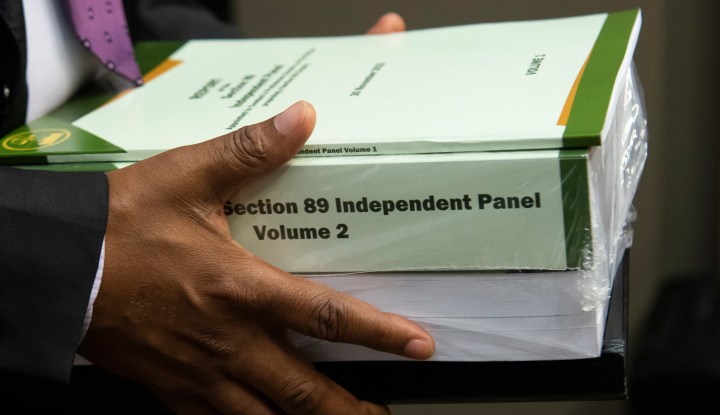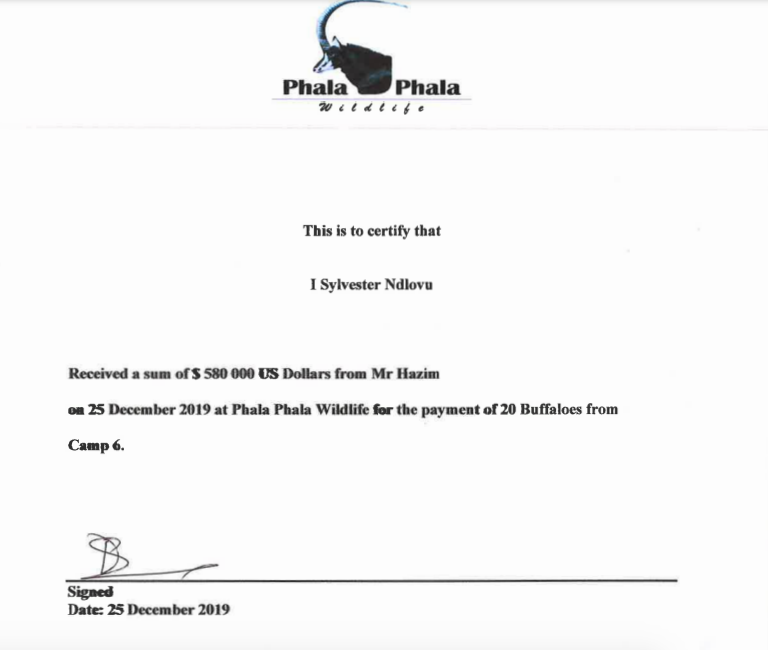PHALA PHALA ANALYSIS
In the eye of the storm: Inside the report that might sink Cyril Ramaphosa

The report which may end the political career of President Cyril Ramaphosa is a strange — and in parts comical — document. It’s possible it could be challenged in court. But it also highlights undeniable problems with Ramaphosa’s account of what happened at Phala Phala.
It sounds like a school maths problem — or perhaps an existential riddle. If a businessman pays $580,000 for 20 buffalo, and then doesn’t collect the buffalo in over two-and-a-half years, did the buffalo really get sold?
This is, genuinely, one of the questions at the heart of the report produced by an independent panel tasked by Parliament with investigating whether there are grounds to impeach President Cyril Ramaphosa over the theft of foreign currency from his Phala Phala farm in 2020.
The panel’s 86-page report is at points downright farcical. But there is nothing remotely funny about its conclusions, which at the time of writing have brought President Ramaphosa to the brink of resigning as head of state.
Too many known unknowns
A proliferation of “known unknowns”, to borrow the famous phrase from George W Bush’s Secretary of Defence Donald Rumsfeld, plague the panellists responsible for the Phala Phala report.
The three-member team — former Chief Justice Sandile Ngcobo, retired judge Thokozile Masipa, and advocate Mahlape Sello — acknowledge from the get-go in their report that they are working with extremely limited information.
Here follows a non-exhaustive list of things the panel writes that it doesn’t know: whether the South African Reserve Bank concluded an investigation into the foreign currency at Phala Phala, and the outcome of the investigation if so; whether Parliament’s Standing Committee on Finance discussed the Phala Phala theft; whether the Public Protector completed her investigation into the matter; what progress has been made by the Hawks and SAPS in probing the Phala Phala theft.
Furthermore, the panel does not know what has come of investigations by the South African Revenue Service, the Financial Intelligence Centre, and Home Affairs.
At their disposal were also distinctly circumscribed powers. They couldn’t summon anyone to give evidence. They couldn’t request any documents. They could only consider “the information placed before [the panel] by members of the National Assembly, and the President’s response to this information”.
All this is obviously ludicrously inadequate in terms of reaching any kind of verdict on the President — which is why the report doesn’t do that.
It states, very plainly upfront, that “it was never intended that the panel should make a finding on whether the President is in fact guilty”.
To elaborate: “It is not the function of the panel to enquire into whether the president is guilty of a serious violation of the Constitution or the law, or a serious misconduct”.
All the panel was trying to determine is whether there was a prima facie case for President Ramaphosa to answer when it came to the circumstances around the theft of money from his Phala Phala farm in 2020. Whether, in other words, it would be worth the time and effort for Parliament to set up an impeachment committee to properly dig into his conduct.
They have found, quite forcefully, that Ramaphosa does indeed have a case to answer — and that that case lies in the mysterious gaps and missing details of the version of events he submitted to the panel.
“We believe the truth of what really happened lies beneath the unanswered questions that are foreshadowed by what we are told from the information placed before us,” they write, which is a long-winded re-phrasing of the X-Files tagline: “The truth is out there”.
The brotherhood of the travelling couch
If this report really does end Ramaphosa’s political career, good luck to foreign correspondents trying to explain to their audience how much of his demise centres on… a couch.
At points the report reads like fan-fiction written by Joshua Doore, as it explores the exact technique one might use to stuff the equivalent of R8.7-million into a sofa in Ramaphosa’s spare room at Phala Phala — as Ramapahosa says his acting farm manager, Sylvester Ndlovu, did after receiving this money from a big-game customer.
How would you arrange the cushion-to-cash ratio? How would you stop the money falling out? Is it relevant that the couch might have been leather? (The panel seems to think so.) In the end they come to a bewilderingly precise conclusion about how this money-hoarding was undertaken: most probably by “turning the sofa upside down, opening it up and stuffing [the cash] inside”.
But in a plot twist nobody saw coming, the report also introduces… another couch.
This is courtesy of the evidence given by former spy boss Arthur Fraser, to which the panel arguably attaches a quite extraordinary amount of weight given the fact that Fraser has an axe to grind with Ramaphosa which could enter the Guinness Book of World Records under the category of Largest Axe Ever.
Who is Arthur Fraser?
- Fraser is the former head of the State Security Agency.
- It was him who allegedly leaked the infamous “spy tapes” to Jacob Zuma, which ultimately resulted in the NPA dropping charges against the former president in 2009.
- In his book, The President’s Keepers, Jacques Pauw claimed Fraser allegedly headed up a parallel intelligence network called the Principal Agent Network programme (PAN).
- A high-level panel investigation into the SSA under Fraser found that the PAN was involved in “serious criminal behaviour… under the guise of conducting covert work…”
- In 2018, after Cyril Ramaphosa became president, he moved Fraser to Correctional Services.
- In September 2021, it was Fraser, then serving as Correctional Services Commissioner, who set Zuma free on medical parole after he had been jailed on contempt of court charges.
Fraser claims that the money in the Phala Phala couch was initially stored in a couch belonging to Ramaphosa’s political adviser Bejani Chauke. This first couch lived in Chauke’s residence in Hyde Park, Johannesburg, and no details are supplied as to its structural material.
The money — stick with me here — was later transferred “in a couch to the President’s residence at the farm”.
The report’s phrasing here is couched in distinctly ambiguous language. Do they mean that Chauke’s money-housing couch was brought to Phala Phala? Or do they mean that the money was transferred to a couch in the President’s residence? Who can say?
The mysterious buffalo-buying businessman
Ramaphosa’s version of events is that the source of all the dollars on his farm was a Sudanese businessman called Mustafa Mohamed Ibrahim Hazim.
Hazim popped by the farm on Christmas Day 2019 — what better time to buy some big game? — to pick out some buffalo “he liked”, and gave $580,000 in cash to Ramaphosa’s hapless employee Ndlovu.
But the section 89 panel wasn’t born yesterday. They have questions about Mr Hazim, and not just because he doesn’t exist on Google.
How did Hazim get this vast quantity of Ben Franklins into South Africa? How did he know the buffaloes were for sale in the first place?
Fundamentally, write the cynics of the panel, “We find the behaviour of Mr Hazim in carrying more than half a million US$ in cash into South Africa and thereafter transporting it to the farm to be un-businessmanlike”.
Un-businessmanlike.
But there’s one even graver issue.
“Why did Mr Hazim buy buffaloes and not take them away?”
For it emerges that the Syncerus caffer caffer personally selected by the discerning Mr Hazim are still jolling there by Phala Phala.
The (very) serious stuff
The issue here, as you may have observed, is that Ramaphosa’s version of events is improbable — and to make matters much worse for him, the statement he submitted to the panel is astonishingly low on details.
Was this because he assumed the whole matter would be chucked out, or because he has something to hide? The panel suspects the latter.
“There are troubling unsatisfactory features in the explanation of the source of the foreign currency given by the President,” they conclude.
Even given the unreliability of Arthur Fraser as a primary witness, and the additional unreliability of the likes of the EFF coming forward with “evidence”, it is hard to see how the panel could have found otherwise.
To give just one example, Ramaphosa submitted as an “invoice” — supposedly proving the existence of the transaction between Hazim and his farm manager — the following document:

As the panel noted, there is absolutely zero supplementary information as to the identity of either Hazim or Ndlovu: not an ID number, not an address, niks. Ndlovu has also not submitted an affidavit testifying as to what happened, despite the fact that he is quite literally Ramaphosa’s star witness.
What the report suggests, as you read through it, is that the panel had to sift through nonsense on both sides, and what it came down to was effectively a “he said/he said” conflict between Ramaphosa and Fraser.
Both sides relied on hearsay; both sides had little in the way of convincing corroborating evidence. As such, the panel wrote that they tried as much as possible to identify third-party proof: and what they scraped together was sufficient to establish a prima facie case against Ramaphosa.
Could a court overturn this strange and slight report? Some legal experts have suggested as much. But that won’t change the fundamental problem for Ramaphosa: that his version of what happened at Phala Phala simply doesn’t stack up — and now that it’s crumbling, it risks taking the country down with it. DM
















 Become an Insider
Become an Insider
Not much of a mystery : Hazim Mustafa is married to a South African, is from Sudan but lives in Dubai. Have you tried to export 20 buffalo and then look after them in Dubai? Being for export, there would be no VAT and technically the money is a deposit to be applied to the price upon actual eventual export. In terms of income, the sale is not yet concluded so income tax is also not relevant. The couch thieves effectively stole Hazim Mustafa’s down-payment, not the president or the farm’s cash. The buffalo are still the farm’s property and still grazing.
Facts matter!